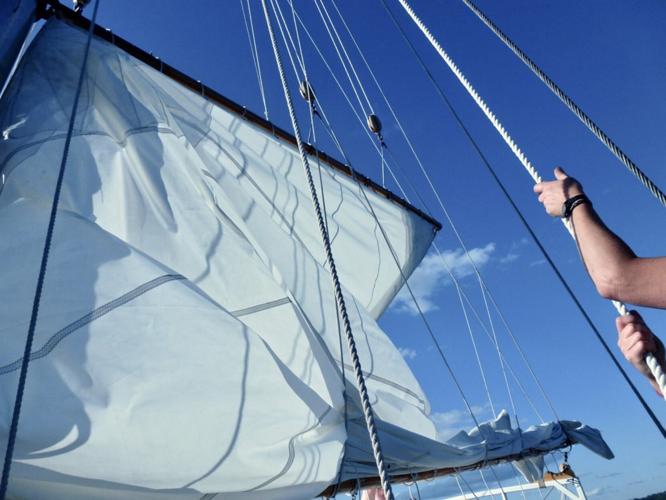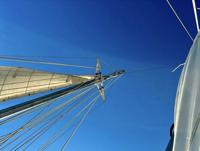HUDSON — While the recent U.S. Supreme Court ruling restricting the authority of the federal Environmental Protection Agency and its efforts to combat climate change startled many, others have continued their commitment to environmental action.
The schooner Apollonia, based in Hudson, transports local foods and products to New York City. It is a 64-foot vessel originally built in Baltimore, Maryland. It was designed by naval architect J. Murray Watts and constructed in 1946.
The Apollonia has the capacity to haul 20,000 pounds of cargo. This type of river transport, known as sale freight, is a nod to history as well as an innovative method to engage in carbon-neutral shipping.
No matter how sustainable the production process is, the shipping industry is still heavily reliant on fossil fuels, Apollonia Capt. Sam Merrett said.
It takes one week for the Apollonia to sail south on the Hudson River. The return trip is also one week. The Hudson has historically been a key leg in transporting cargo, particularly with the development of the Erie Canal.
The Erie Canal made it possible to ship goods between New York Harbor and the Great Lakes. Originally, the Mohican tribe referred to the river as “Great Waters Constantly in Motion.” With European colonialism came the renaming of the river in honor of the English explorer Henry Hudson.
The Apollonia’s mission is to connect the Hudson Valley region with the global marketplace in New York City, Merrett said. The schooner sails with Merrett and a crew of four: Tianna Kennedy, Tanya Van Renesse, James Farrell and Tom Macom.
“I’ve always been drawn toward practical solutions that you can implement now,” Merrett said. “The Apollonia’s month-long sail freight trips are a great opportunity for crew members to learn first hand and gain experience aboard a boat.”
The crew employs traditional sailing techniques but have embraced new high-tech navigational instruments, Merrett said. There are many educational benefits of sale freight.
Sale freight is an alternative transport method that helps to educate the public about the environmental effects the shipping industry has on both the land and water.
Merrett also works as Hudson’s Sloop Club Water Department Director and manages the club’s commercial docking. The Hudson Sloop Club is responsible for managing the dock space.
Hudson has begun its summer season of Waterfront Wednesdays, a weekly series of events that offers the public a chance to learn and appreciate the Hudson River. The public can sail aboard the Apollonia or take a tour of the Hudson-Athens Lighthouse.
Interested parties can check the website for updates or call 914-589-7773 to schedule the trips. Tickets for the Catskill Mountain Ferry Company’s Saturday tours can be purchased at: www.catskillmountainferry.com
It is recommended to reserve a spot prior to arrival. Both boat rides are free to the public during Waterfront Wednesdays. For a complete schedule and list of activities and events or to make a reservation for a boat tour, visit www.hudsonartscoalition.org. Be sure to wear closed-toed and flat shoes. There are no ATMs within walking distance of Henry Hudson Riverfront Park so be sure to bring cash.
Editor's note: This article reflects a correction to the time it takes to to sail the freight trip. The sail freight trip takes one week and the return trip is also one week.















